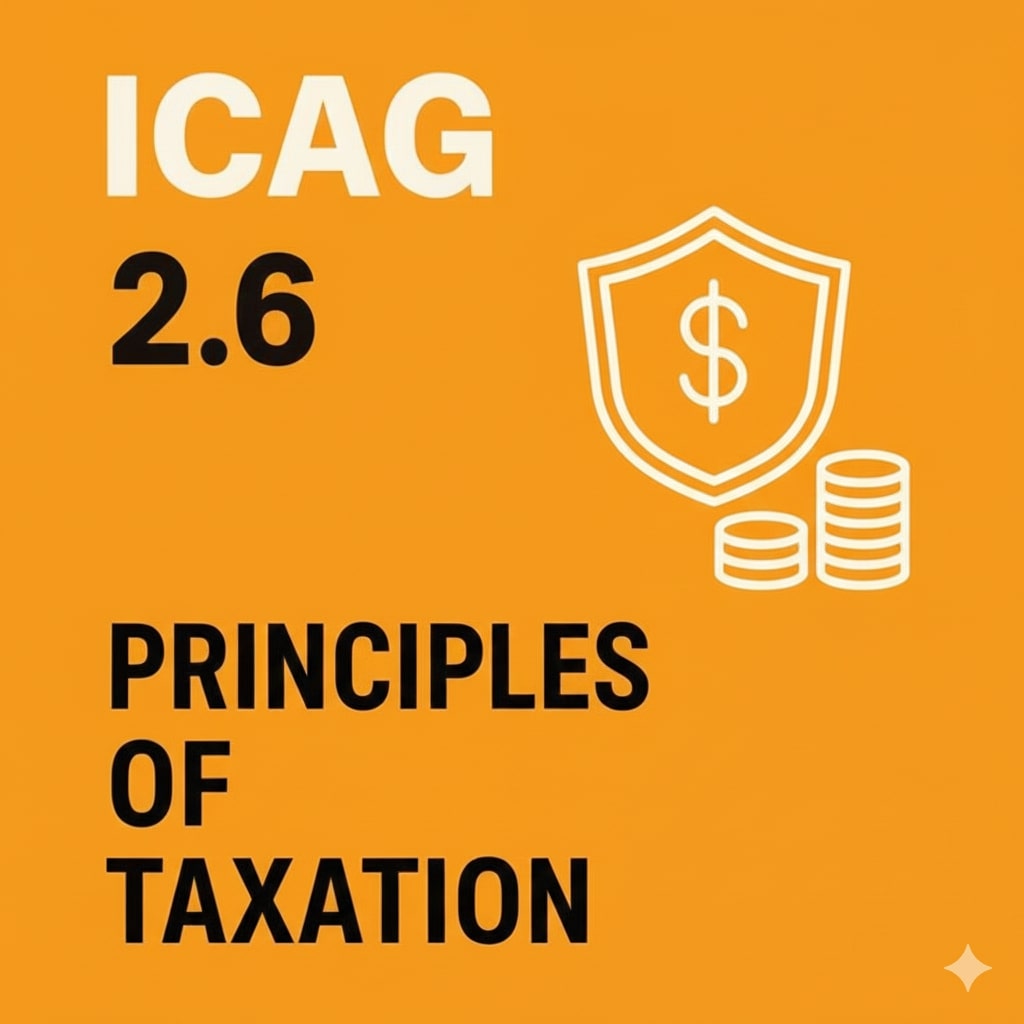The Principles of Taxation module (Paper 2.6) is part of the Skills Level (Level 2) in the ICAG professional qualification syllabus. It builds on foundational concepts from the Knowledge Level, focusing on the Ghanaian tax system and fiscal policy, tax administration, computation of income and corporate tax liabilities, taxation of capital gains, value-added tax, customs and excise duties, withholding tax, the application of information technology in taxation, and ethical issues in tax practice to ensure compliance and effective tax management.
Below is the syllabus coverage in tabular form, including main topics and their approximate weightings (guiding study time and exam mark allocations).
| Syllabus Topic | Description | Weighting (%) |
|---|---|---|
| A. Ghanaian tax system and fiscal policy | Describe the key principles of, and the bodies with responsibility for, the Ghanaian tax system, including: The overall role and purpose of taxation in a modern economy; Classification of taxes (including kinds/types of taxes); Principal sources of tax law and practice in Ghana; The basic taxpayers’ rights and obligations; Establishment and the governance structure of Ghana Revenue Authority; The structure of the tax system in Ghana: progressive, proportional and regressive. Explain the impact of government and central bank fiscal and monetary policies, with particular attention to the following: Monetary policy; Fiscal policy; Types of fiscal policies; National and public debt and their implication on the national economy; Government grants and inter-governmental transfers in relation to local governments. | 10 |
| B. Tax administration | Explain the administration of the Ghanaian tax system, including: System for assessments and the preparation of tax returns; Time limits for the submission of returns, claims and payment of tax, including payments on account in respect of tax types; Time to file, pay and claim, refunds and set offs; Taxpayer identification number and tax clearance certificate; Procedures relating to compliance checks, disputes resolutions, objections, and appeal procedures; Payments and recovery of tax liabilities; Offences, penalties, and interest for non-compliance; Proceedings to recover tax, interest and penalties; Official language and currency for taxation in Ghana; Forms, documents, and notices used in the tax system; Tax refund and GRA general refund account. | 10 |
| C. Income tax liabilities | Explain and compute the income tax liabilities of individuals and partners in partnerships, considering the following: The scope of income tax; Residents and non-residents individuals and partnerships; Income from employment including casuals and temporary staff; Overtime allowances and bonus payments; Income from business (trade, profession, and vocation) including partnerships; Income from investment. Treatment of gift tax; Quantification of benefits (benefits in kind); Other individual compensations. Comprehensive computation of taxable income and income tax liability, including capital allowances; The use of exemptions and reliefs in deferring and minimising income tax liabilities; Computation of pensions e.g., Social Security (SSF), second tier mandatory and third tier voluntary contributions; Computation of pensions in respect of employer and employee. | 15 |
| D. Corporate tax liabilities | Explain and compute the tax liabilities of entities, i.e., companies and trusts. Explain and compute the income tax liabilities of companies, including: The scope of company tax; Resident and non-resident companies; Taxable profits/chargeable income; Allowable and non-allowable deductions; The comprehensive computation of company tax liability. The use of exemptions and reliefs in deferring and minimising company tax liabilities; Treatment of tax on gifts. | 15 |
| E. Taxation of capital gains | Explain and compute the taxation of gains arising from the realisation of assets and liabilities by companies and individuals. Explain and compute taxation of gains and losses from the realisation of capital assets and liabilities including investment assets by companies and individuals, paying attention to: The scope of taxation of gains; The basic principles of computing gains and losses; Gains and losses on the disposal of movable property; Gains and losses on the disposal of shares and securities; The computation of tax on gains made by individuals; The use of exemptions and reliefs in deferring and minimising tax liabilities arising on the disposal of capital assets. | 10 |
| F. Value-added tax, customs and excise duties | Explain and compute value added tax on supplies by taxable persons. Explain and compute the effect of value added tax and customs duty on taxable supplies by taxable persons, paying attention to: The scope of value added tax (VAT); The VAT registration requirements; The computation of VAT liabilities; Customs entry or customs declaration; Methods for customs valuation; Computation of customs duty; Duty drawback computations; Warehousing regime under customs; Basic principles of excise duty/taxes. | 15 |
| G. Withholding tax administration | Understand withholding tax administration. Explain and compute withholding taxes on payments, paying attention to the following: Goods, works and services in respect of resident and non-resident persons; Investment returns e.g., dividend, interest, natural resource payment, rent and others; Withholding tax exemptions; Issuance of tax credit certificates; Obligations of withholding agents; Rights and responsibility of withholdees; Withholding VAT; Advantages of withholding taxes. | 10 |
| H. Application of information technology in taxation | Explain how information technology has influenced taxation. Explain the implications of information technology for tax practitioners, paying attention to the following: The impact of information technology on tax revenue; The effects of technology on modern tax administration in Ghana; Electronic tax accounts and e-invoicing; The impact of new technologies including data analytics, automation and artificial intelligence on tax practice and administration. | 10 |
| I. Ethical issues in tax practice | Explain the importance of ethics in tax practice. Identify ethical issues arising in the course of tax practice, paying particular attention to: Recognising ethical dilemmas arising in a given situation and suggest solutions; Explaining the implications for taxpayers of non-compliance; Recognising possible instances of money laundering by taxpayers; Exercising professional scepticism and judgement with regard to sources of information and data. | 5 |


